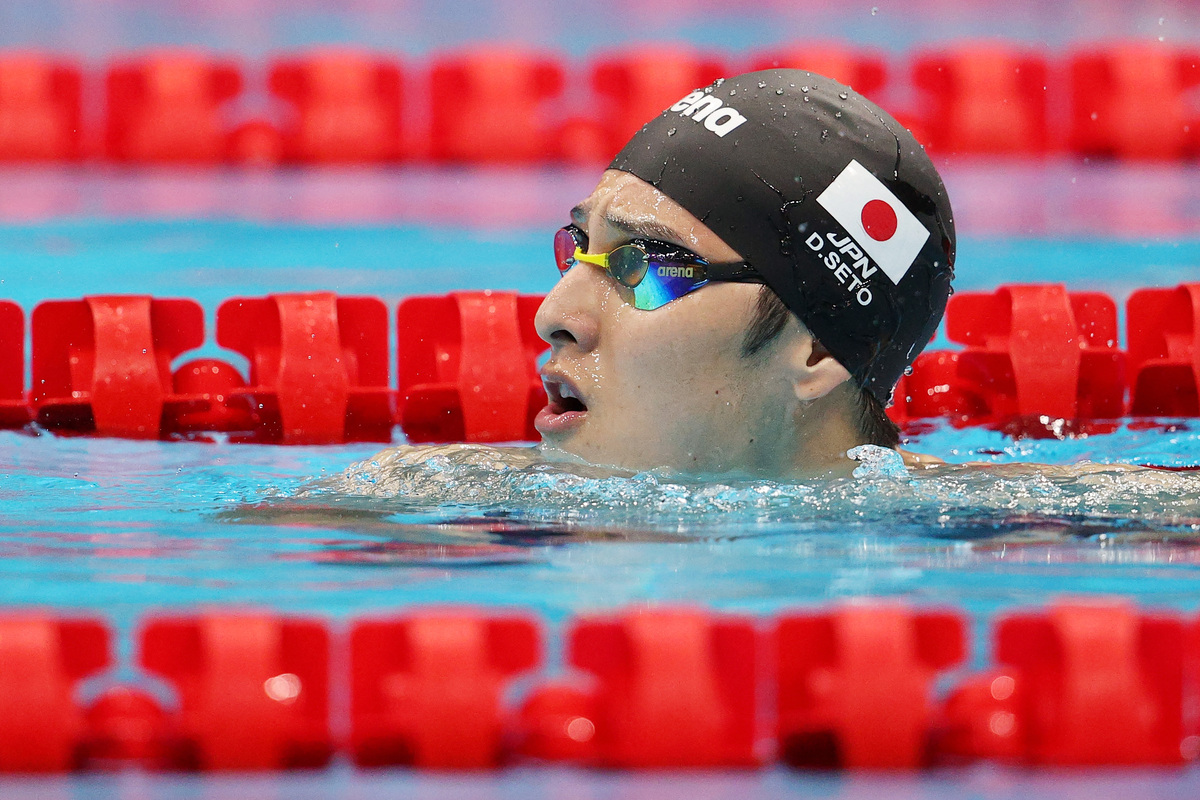Tokyo bids adieu to Paralympics with message of change
After the lowering of the Paralympic flag, the baton was handed over to Paris for the 2024 Games
“Five years ago, I went too fast in the prelims and couldn’t go fast enough in the finals,” Seto said. “I tried to avoid that.”
AP | Tokyo | July 24, 2021 7:44 pm

Daiya Seto
Daiya Seto was so confident of advancing to the 400-meter individual medley final in his home Olympics, the Japanese star made a costly mistake.
He didn’t go fast enough.
Advertisement
Seto surprisingly failed to qualify, finishing ninth on the opening night of swimming on Saturday. He missed the eighth and last spot for Sunday morning’s final by 32-hundreds of a second. He touched in 4 minutes, 10.52 seconds.
Advertisement
“Even in the last hundred, I didn’t let it all out,” Seto said through a translator. “Even when the other swimmers were coming near me.”
Seto was the bronze medalist at the 2016 Rio Games and a three-time world champion in the event. He was trying to deliver Japan a second straight gold medal in the event won in Rio by Kosuke Hagino.
“Five years ago, I went too fast in the prelims and couldn’t go fast enough in the finals,” Seto said. “I tried to avoid that.”
Instead, the opposite happened and now Seto will have to focus on his two remaining events.
Brendon Smith of Australia topped the men’s 400 IM qualifiers in 4:09.27. Lewis Clareburt of New Zealand was second-quickest in 4:09.49. American Chase Kalisz, the silver medalist in Rio, qualified third in 4:09.65.
David Verraszto of Hungary, the oldest swimmer in the event at age 32, moved on in fourth. Also advancing was Jay Litherland of the U.S.
Without fans in the 15,000-seat Tokyo Aquatics Centre, masked teams had ample room to spread out in socially distanced seats above the deck. The U.S. contingent waved tiny American flags and pounded red-white-and-blue Thunderstix, while the Germans spread their large-sized flag over two rows of seats.
Waiting for the session to begin, the Americans chanted “Dr. Biden, Dr. Biden” and clapped. The U.S. first lady, sitting across the pool, stood and waved back. The U.S. team was easily the most spirited, on its feet, whistling and cheering for its swimmers.
“USA was pretty loud,” Litherland said. “I felt like the whole crowd was there.”
But none of the usual electricity that typically courses through the Olympic pool was present. Teams shouted the names of their swimmers during the races, and the sound of water splashing was easily heard and music played.
“It was definitely different,” American Torri Huske said. “But with the COVID year, I felt like I kind of got used to it. Also, just knowing it’s the Olympics and I’m swimming against fast girls made it so exciting.”
Defending Olympic champion and world recordholder Adam Peaty of Britain easily qualified in the men’s 100 breaststroke in 57.56 seconds. U.S. teammates Michael Andrew and Andrew Wilson moved on in third and fourth.
“It felt like any other 100 breaststroke I’ve ever swum,” said Andrew, whose unvaccinated status stirred debate ahead of the Games. “It felt like any other pool I’ve ever swam in. Granted, it’s a beautiful one. So it’s one of those things where I realized we can make it into something bigger than it is in our minds. I’m just approaching like any other swim meet.”
It wasn’t as easy for Katinka Hosszu of Hungary.
She barely qualified for the women’s 400 IM final, claiming the seventh spot in 4:36.01. At 32, the defending Olympic champion and five-time world champion was the oldest woman in the field. Emma Weyant, a 19-year-old American, led the way in 4:33.55.
In the women’s 100 butterfly, China’s Zhang Yufei and Emma McKeon of Australia tied for the fastest qualifying time of 55.82.
Defending Olympic champion Sarah Sjöström of Sweden advanced to the semifinals in third at 56.18. Her training was disrupted after she broke her right elbow in February, slipping on ice.
A pair of American teenagers moved on in their Olympic debuts. Huske, an 18-year-old from Virginia, was fourth-quickest. Claire Curzan, a 17-year-old from North Carolina, finished 10th.
Current world champion Maggie MacNeil of Canada advanced in fourth.
In the men’s 400 free, Henning Muhlleitner of Germany qualified fastest in 3:43.67. Australians Elijah Winnington and Jack McLoughlin and U.S. teammates Kieran Smith and Jake Mitchell all advanced to Sunday’s final.
Australia’s Mollie O’Callaghan, Meg Harris, Madison Wilson and Bronte Campbell led the women’s 4×100 freestyle relay qualifying in 3:31.73. The U.S. team of Olivia Smoliga, Catie DeLoof, Allison Schmitt and Natalie Hinds advanced in fifth.
Advertisement
After the lowering of the Paralympic flag, the baton was handed over to Paris for the 2024 Games
The Organising Committee for Tokyo Olympic and Paralympic Games (TOKYO 2020) announced four of these five Covid positive tests on Friday
Prime Minister Yoshihide Suga is pinning his hopes on vaccinations, which started slow but now are making good progress.
Advertisement
